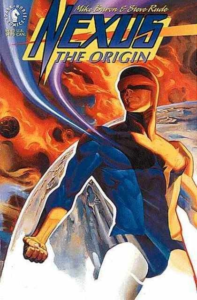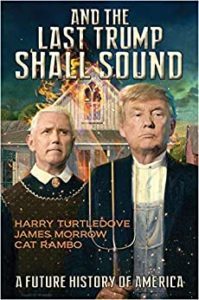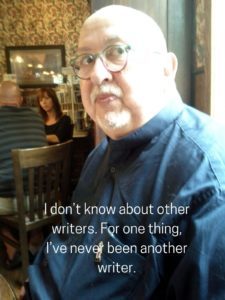Cat Rambo's Blog, page 16
October 8, 2020
Video: Writing for Franchises with Jennifer Brozek
Jennifer Brozek is a multi-talented, award-winning author, editor, and media tie-in writer. She is the author of the Never Let Me Sleep, and The Last Days of Salton Academy, both of which were nominated for the Bram Stoker Award. Her BattleTech tie-in novel, The Nellus Academy Incident, won a Scribe Award. Her editing work has netted her Bram Stoker Award and Hugo Award nominations. She won the Australian Shadows Award for the Grants Pass anthology. Jennifer’s short form work has appeared in Apex Publications, Uncanny Magazine, and in anthologies set in the worlds of Valdemar, Shadowrun, V-Wars, Masters of Orion, and Predator. Jennifer is also the Creative Director of Apocalypse Ink Productions.
In this interview, Jennifer talks about writing for franchises, including Shadowrun and Valdemar, what has surprised her about the process, what worlds she hasn’t written in but would like to, and which of her original worlds would make the best franchise, as well as what advice she’d give to people working in it.
Jennifer teaches Working in Other Worlds: Writing for Franchises with Jennifer Brozek, for the Rambo Academy for Wayward Writers. The next class will be Saturday, October 24, 2020, 1:00-3:00 PM Pacific Time.
Have you ever wondered what it would be like to write fiction for your favorite RPG, movie, TV series, videogame, or comic book? The Writing for Franchises workshop can give you an idea of what it is like to write in a universe you do not own—the benefits, the pitfalls, and some of the details you should be aware of. This workshop is focused around writing short stories, novellas, and novels for popular franchises such as Shadowrun, V-Wars, Predator, Master of Orion, and Valdemar.
October 7, 2020
Guest Post: Mike Baron on Horror Comics
 Literature is the best medium for horror, and comics are the worst. Literature succeeds because of the power of words to suggest, to take you ninety percent there, and leave that final ten percent up to you. The horror we imagine in the darkness of our minds far exceeds anything that can be set down on paper in words or pictures. We love horror because it allows us to exorcise our fears in a safe and fun manner. It usually delivers a moral epiphany, as Mary Shelley intended.
Literature is the best medium for horror, and comics are the worst. Literature succeeds because of the power of words to suggest, to take you ninety percent there, and leave that final ten percent up to you. The horror we imagine in the darkness of our minds far exceeds anything that can be set down on paper in words or pictures. We love horror because it allows us to exorcise our fears in a safe and fun manner. It usually delivers a moral epiphany, as Mary Shelley intended.
There’s also existential horror with no good guys or bad guys, like The Devil’s Rejects. Without a moral epiphany no film can hope to reach a wider audience. Exorcist is not only the scariest movie ever made, it’s one of the most moral.
But enough about that. We’re talking scares. Movies do horror well as they control not only pacing, but every aspect of the experience. They can manipulate what you see—or what you think you see—on the screen. They can scare the bejesus out of you with sudden motion, unexpected thrusts from unexpected places. These tropes prove irresistible to hack filmmakers who fill their film with ominous musical crescendos and fake scares. Which brings us to pacing. You want to catch your audience off-balance—that’s why you throw in the fake scare followed a split-second later with the real scare.
Comics can’t do that. They must rely on the storytelling alone for inevitably, when the big scene comes—the full-page panel of the werewolf or the witch or the monster—it’s just a drawing on paper. Sure, there have been some horrible drawings in comics—pictures of torture or mutilation—but is this really horror? Or is it just Grand Guignol? You set the comic down and it goes away.
Horror is an intimate, terrifying sensation. It’s far more than disgust, and you all know what I’m talking about. You can count on the fingers of one hand those movies that touch on real supernatural evil. They’re the ones you remember.
Why are horror comics so popular?
People love the genre and the whiff of cheese issuing from the sideshow exhibit. The great EC tales in Shock Suspenstories, Tales from the Crypt and their ilk create horror by leaving the protagonist in a horrible situation. Buried alive. Chained to a corpse in a desert. As children, we can all relate because we can all imagine ourselves in that situation. The best comic book horror succeeds through powerful storytelling and great characterization. Alan Moore’s Swamp Thing or even Al Capp’s Li’l Abner, like the time Abner was trapped in the mushroom cave with no hope of rescue. We experience a visceral horror through the protagonist because we care about him, her, or it. It’s not the same jolt as in the George C. Scott movie The Changeling when that ball comes bounding down the stairs.
In Nexus, Steve Rude and I are always trying to put our finger on the pulse of evil. But true horror depends on the unknowable— and we don’t know the unknowable. So how can we show it? The best we can do is dance around the edges and try to capture aspects of evil that ring true.
In comics, as in life, the true horror lurks just beyond our senses.
 BIO: Mike Baron broke into comics in 1981 with Nexus, his groundbreaking science fiction title co-created with illustrator Steve Rude; the series garnered numerous honors, including Eisners for both creators. A prolific creator, Mike is responsible for The Badger, Ginger Fox, Spyke, Feud, and many other comic book titles. Baron has also written numerous mainstream characters, most notably DC’s The Flash, Marvel’s The Punisher, and several Star Wars adaptations for Dark Horse. He lives in Colorado with his wife, dog, cat, and wildebeest.
BIO: Mike Baron broke into comics in 1981 with Nexus, his groundbreaking science fiction title co-created with illustrator Steve Rude; the series garnered numerous honors, including Eisners for both creators. A prolific creator, Mike is responsible for The Badger, Ginger Fox, Spyke, Feud, and many other comic book titles. Baron has also written numerous mainstream characters, most notably DC’s The Flash, Marvel’s The Punisher, and several Star Wars adaptations for Dark Horse. He lives in Colorado with his wife, dog, cat, and wildebeest.
Find out more at Mike’s website www.bloodyredbaron.com or on Twitter @BloodyRedBaron.
If you’re an author or other fantasy and science fiction creative, and want to do a guest blog post, please check out the guest blog post guidelines. Or if you’re looking for community from other F&SF writers, sign up for the Rambo Academy for Wayward Writers Critclub!
September 28, 2020
Video: Interview with David Steffen
If you’re not familiar with the Submission Grinder, it’s a web utility that many genre writers spend a lot of time staring at. I thought it would be interesting to talk to David about how the Grinder came about and what it does.
Other links referenced in the video:
“Hakim Vs. the Sweater Curse” by Rachael K. Jones
“The Dictionary For Dreamers” by Cislyn Smith
New Book, and Various Exhortations of an Inspirational Nature
 This is an elaboration of the first part of my most recent newsletter, because I wanted to spread the message a bit farther, and expand on some of it. If you want to see the rest of the newsletter, which has class news and a giveaway for a copy of the new book, it’s here.
This is an elaboration of the first part of my most recent newsletter, because I wanted to spread the message a bit farther, and expand on some of it. If you want to see the rest of the newsletter, which has class news and a giveaway for a copy of the new book, it’s here.
It’s always exciting for me when a project comes out, and particularly when it’s an actual book. Last week marked a special “book birthday” because my collaboration with James Morrow and Harry Turtledove, And the Last Trump Shall Sound, came out. I wrote the novella pre-pandemic, and it was an interesting challenge in multiple ways, partly because of the subject matter and where it is placed in time and partly because of the wildly different natures of the three novellas.
Here’s the description of the book:
And the Last Trump Shall Sound is a prophetic warning about where we, as a nation, may be headed. Mike Pence is President of the United States after years of divisive, dogmatic control by Donald Trump. The country is in turmoil as the Republicans have strengthened their stronghold on Congress, increasing their dominance. And with the support of the Supreme Court, more conservative than ever, State governments become more marginalized by the authoritarian rule of the Federal government.
There are those who cannot abide by what they view as a betrayal of the nation’s founding principles. Once united communities break down and the unthinkable suddenly becomes the only possible solution: the end of the Union.
The authors’ depiction of a country that is both unfamiliar and yet unnervingly all too realistic, make you realize the frightening possible consequences of our increased polarization—a dire warning to all of us of where we may be headed unless we can learn to come together again.
As you can imagine, reviews have been mixed in a way that seems to correspond to the politics of each reviewer. My favorite declared the book unfit for Christians to read, which is a first for any of my books. I will say this — they are wildly different novels in terms of style. Harry’s is thoughtful alternative history, which James then takes in a highly satirical direction. I follow-up with something that is more SFnal, and a bit Black Mirror-ish.
And in mine, I tried to talk about the fact that everyone on the continental United States, whether they’re part of Pacifica, the nation that Harry creates when he has the states of California, Oregon, and Washington break off from the rest of the country, or the collective formed by the East Coast states, or what’s left of the US — is part of a corporate-driven system that treats American citizens as commodities to be used to make the rich richer.
That seems important to me, because the forces we’re fighting are certainly using weapons like racism, sexism, homophobia, and the like, but in the end, they are the people who have taken the wealth of the world — which could be used to house the homeless, to feed the hungry, to teach and heal the world — and use it to create things like gold-plated toilets for them to shit in.
As part of the publicity beforehand, we’ve been doing a lot of podcasts in the past month. Over and over I have found myself saying something important: We’re in the last weeks before the election and it is so important to stay the course, because this really is the last chance to break some of the hold that malignant forces have exerted over American politics.
Some but not all, not by a long shot. We’ll still have hatred, fear, and divisiveness used against us by the people struggling to maintain that hold. But getting as many as we can out of office in this election is vital, particularly at the local level. If you are an American citizen, please vote and encourage those around you to exercise their right to do so as well.
As we come into these final days before the election, you will see unprecedented efforts to spread mistruths, to distract and confuse, and to divide us. Stay strong and focused. Maintain your own health and take a breather when you need to. Factcheck before you spread information. Encourage and enable those on the front lines of this fight.
And be kind. Be loving. Be generous and honest and open in your vulnerabilities, because in these days, that is a rebellious act. Be gentle when you can and fierce when you need to be. Know that you are loved. Know that we are all in this together.
Peace,
Cat

September 23, 2020
Guest Post: Carrie Vaughn on That Ineffable Quality of Voice
Ask many writers what got them to the next level, what separates great writers from good writers, sparkling writing from the merely competent, and they’ll often give the same answer: voice. A voice that stands out, that grabs the reader and yanks them in. The thing that makes an author’s writing completely their own.
Of course, nobody can agree exactly on what “voice” means. I’ve collected a few quotes:
“Voice is the author’s style, the quality that makes his or her writing unique, and which conveys the author’s attitude, personality, and character; or. Voice is the characteristic speech and thought patterns of the narrator of a work of fiction.”
(From a website: The Balance, and the thing that pops up as the definition if you type fiction and voice into Google.)
“What the heck is “voice”? By this, do editors mean “style”? I do not think so. By voice, I think they mean not only a unique way of putting words together, but a unique sensibility, a distinctive way of looking at the world, an outlook that enriches an author’s oeuvre. They want to read an author who is like no other. An original. A standout. A voice.”
(Donald Maas, Writing the Breakout Novel)
“Voice is a word critics often use in discussing narrative. It’s always metaphorical, since what’s written is voiceless. Often it signifies the authenticity of the writing (writing in your own voice; catching the true voice of a kind of person; and so on). I’m using it naively and pragmatically to mean the voice or voices that tell the story, the narrating voice.”
(Ursula K. LeGuin, Steering the Craft)
“I think it is because, in fiction, if you like the person telling you the story—which is to say the voice, not the author—you generally will let them tell you a story.”
(Ta-Nehisi Coates, “What Makes Fiction Good is Mostly the Voice” in The Atlantic)
So, “voice” is the thing that makes us want to read the story. To spend time with the characters and their story. How, then, does one learn to write in a “voice” that makes readers want more?
Nobody’s quite figured that out, near as I can tell. But I can share how I finally started getting a handle on the concept: I wrote fourteen novels about the same character.
Kitty is a werewolf who hosts a talk radio advice show for supernatural creatures. She first appeared in a short story in Weird Tales in 2001. The final novel in her series, Kitty Saves the World, was published in 2015, and this year a collection, Kitty’s Mix-Tape, pulls together short stories set in the world, plus a few brand-new stories. So I’ve been writing this character for more than twenty years. “Voice” was key to getting her right.
Kitty’s identity as a radio DJ was instrumental in her development. In a very early (abandoned) draft, Kitty was passive. Other characters argued while she stood there observing and thinking snarky thoughts. This wasn’t going to work—as clever as her snark seemed at the time, she wasn’t an active participant in what was happening, which is sort of a requirement for the protagonist, yes? (There’s another lesson and blog post there, I think—you’d be surprised how often I tell people in critiques: your protagonist needs to do something.)
So I went back and put quote marks around all those snarky thoughts. She was now saying those snarky things out loud. I realized—she’s a DJ who talks for a living, and would not keep her mouth shut. Of course she would use her outside voice. Suddenly, everyone in that scene turned to look at her. Suddenly, she was the center of attention.
That moment, that simple act of giving Kitty a voice, changed everything. Her chattiness became one of her defining characteristics, and it moved her to the center of the story. Moreover, that simple, mechanical act of characterization had bigger consequences. I had found Kitty’s literal voice—what she says and how she says it. But I had also begun to discover the more esoteric, ephemeral idea of “voice” in writing.
Kitty’s literal voice is powerful and quirky. I had to be able to portray that voice across all the prose, not just dialogue, or the stories would never work. That brash, quirky voice had to infuse the whole narrative.
That’s the lesson: Who is narrating your story, and how is that embodied through the entire work? If the story is first-person point of view about one character, that answer is easy. Close third person, also pretty easy. If you have a more distant narrator, or an omniscient narrator, you still have to answer that question: What is the narrator’s attitude toward the story they’re telling? What tone do you want to convey? Do you want the tone to sound friendly, distant, academic, casual? How will that tone interact with the story being told? How do you want the reader to react?
It all comes down to one thing: How confident are you, the author? Because that narrative voice has to convey that confidence, if you want your reader to trust you and come along for the ride.
I wrote fourteen novels about Kitty, and a couple dozen short stories, and I think I was able to do so because her voice was such an important part of her character I needed to infuse all of the writing with it.
I’ve been able to take that lesson and carry that to the rest of my writing, even with characters who aren’t chatty and outgoing. Four years or so after I started writing the Kitty novels, my short story writing in particular took a leap in quality. I think many writers, myself included at one point, think they have to be formal in their writing. Neutral, even, or dispassionate. In fact, the opposite may be true. Stories should be filled with personality. The personality of the world, the characters. Every word should feel like an actor delivering a monologue to an audience. You’re telling a story, not lecturing.
Thinking about the narrator, and conveying confidence and personality and punch—it’s not just about reading stories, but feeling them. In a sense, every story is a confession to the reader, and voice is what helps the reader feel like they’re part of that story. I’m still reaping the benefits of what Kitty taught me.
 BIO: Carrie Vaughn’s work includes the Philip K. Dick Award winning novel Bannerless, the New York Times Bestselling Kitty Norville urban fantasy series, and over twenty novels and upwards of 100 short stories, two of which have been finalists for the Hugo Award. Her most recent work includes a Kitty spin-off collection, The Immortal Conquistador, and a pair of novellas about Robin Hood’s children, The Ghosts of Sherwood and The Heirs of Locksley. She’s a contributor to the Wild Cards series of shared world superhero books edited by George R. R. Martin and a graduate of the Odyssey Fantasy Writing Workshop. For more about Carrie Vaughn, visit her website.
BIO: Carrie Vaughn’s work includes the Philip K. Dick Award winning novel Bannerless, the New York Times Bestselling Kitty Norville urban fantasy series, and over twenty novels and upwards of 100 short stories, two of which have been finalists for the Hugo Award. Her most recent work includes a Kitty spin-off collection, The Immortal Conquistador, and a pair of novellas about Robin Hood’s children, The Ghosts of Sherwood and The Heirs of Locksley. She’s a contributor to the Wild Cards series of shared world superhero books edited by George R. R. Martin and a graduate of the Odyssey Fantasy Writing Workshop. For more about Carrie Vaughn, visit her website.
If you’re an author or other fantasy and science fiction creative, and want to do a guest blog post, please check out the guest blog post guidelines. Or if you’re looking for community from other F&SF writers, sign up for the Rambo Academy for Wayward Writers Critclub!
September 22, 2020
Video: Interview with Yaroslav Barsukov
Here’s an interview with Russian speculative fiction writer Yaroslav Barsukov, the first installment of whose novella, “Tower of Mist and Straw” appeared in the September issue of Metaphorosis Magazine:
We had a delightful time discussing the genesis of his novella, writer’s block, Russian speculative fiction and specifically Russian fantasy, as well as his hopes for the novella.
September 21, 2020
Anthology Call: The Reinvented Heart
 Science fiction often thinks about the technology and science without considering the ways social structures will change as tech changes — or not. What will relationships look like in the future when we have complications like clones, uploaded intelligences, artificial brains, body augmentation? What happens when emotions like love and friendship span vast distances — in space, in time, and in the heart? And as we acknowledge differences in gender in a way we never have before, what stories are finally given the space in which to emerge?
Science fiction often thinks about the technology and science without considering the ways social structures will change as tech changes — or not. What will relationships look like in the future when we have complications like clones, uploaded intelligences, artificial brains, body augmentation? What happens when emotions like love and friendship span vast distances — in space, in time, and in the heart? And as we acknowledge differences in gender in a way we never have before, what stories are finally given the space in which to emerge?
This anthology will present science fiction by female and nonbinary writers, including some of the finest talents in speculative fiction who have already pledged stories or poems. Writers of color, QUILTBAG writers, writers with disabilities, and neuro-diverse writers are actively encouraged to apply, as are writers from outside America.
Open for submissions Oct 1-October 31. The link to the submission portal will be posted here at that time.
Guidelines:
Please remove identifying information from the manuscript, but otherwise use standard manuscript format.
Length: 500-5000 words (5k is going to be a tough sell)
Buying: Original fiction
Paying: 8 cents a word (SFWA pro rates)
No multiple or simultaneous submissions
Timeline:
Submissions open Oct
The first round of reading will run November 1 through November 31. All submissions will be informed on December 1 whether or not they are being held for further consideration. The final table of contents will be announced on December 31.
The book will be published in the summer of 2021 by Arc Manor Press.
Slush readers: To apply to read as a slush reader for the project, mail me with your contact information and include a) 1-2 sentences about why you’d like to participate, b) any previous slush-reading experience and c) time constraints I should be aware of.
There will be two slush reader orientation sessions in the last week of October; readers are expected to attend one and to commit to at least 2-3 hours evaluating manuscripts each week.
September 17, 2020
September 16, 2020
Guest Post: Daniel Pinkwater on How He Exercises His Profession
 I don’t know about other writers. For one thing, I’ve never been another writer. For another, although I’ve observed practically all the interviews, or as in this case requested from writers, are about how the writing is done, creative tricks, recipes and such. I can’t listen to, view, or read that stuff…not that it isn’t full of useful information, just that my attention wanders, or I fall asleep. So, the nice guy who works for the publisher and arranges this kind of thing told me it would be a good idea if I wrote something about writing. And I just told you that I really don’t know anything about how other writers do it.
I don’t know about other writers. For one thing, I’ve never been another writer. For another, although I’ve observed practically all the interviews, or as in this case requested from writers, are about how the writing is done, creative tricks, recipes and such. I can’t listen to, view, or read that stuff…not that it isn’t full of useful information, just that my attention wanders, or I fall asleep. So, the nice guy who works for the publisher and arranges this kind of thing told me it would be a good idea if I wrote something about writing. And I just told you that I really don’t know anything about how other writers do it.
I’m on a bit of a spot here, because I’m not sure I know anything about how I do it. But I do have an idea. This idea is brand-new, I just came up with it the other day. It’s based on something I observed about a dog we have. This is a pure-bred rough collie, presently about 18 months old. I digress for a moment to tell you that for two people who are pushing 80 to go out and buy for a lot of money, an energetic 13 week old puppy is completely insane, but that’s what we did. What you’re supposed to do is match the dog to your own time of life, seniors should get a senior dog, doesn’t move so fast and naps more, just like us. We did the opposite. We had the puppy for a month or so when Jill, that’s my wife, got bitten by a tick, it was bearing a tick-borne disease, Erlichiosis, which is nasty. Jill wound up in the hospital more or less out of her mind for five days, and then did 41 days in rehab. While this was going on the puppy went back to the farm with mom and dad and the sibs.
When Jill was home and well enough, the breeder brought the puppy, now around 6 months old. We didn’t expect the pup would remember us very well, probably hardly at all. But we were wrong. She came in the door. “I’m back!” she said, gave us each a fast lick, and curled up next to Jill’s chair in the spot she had napped before the interruption. Later she took me on a tour of our house, “These are the stairs to your office. Here’s where I stole the 3×5 cards and brought them to you one by one, just like I’m doing now…still funny. I’m not supposed to get onto this couch, but this ratty one is ok.”
The puppy, her name is Peach, by the way, remembered everything, and had quite a bit earlier in her short life clicked on her role as “our dog,” and she even loved us without rhyme or reason, undeterred by how uninteresting we are, it was all, everything, baked in. She had to learn a few minor things, don’t bite, don’t poop indoors, walk nicely on the leash, but all the essential stuff was in place and only awaiting whatever prompts activation.
And, believe it or not, I never gave this thought until this week. That, in the case of this one writer, not speaking for or about anyone else, is how I exercise my profession.
Daniel Pinkwater is, in brief, the author and sometimes illustrator of over 80 (and counting) wildly popular books. He is also an occasional commentator on National Public Radio’s All Thing Considered and appears regularly on Weekend Edition Saturday, where he reviews exceptional kids’ books with host Scott Simon. Said books usually go on to become best-selling classics.
If you’re an author or other fantasy and science fiction creative, and want to do a guest blog post or video interview, please check out the guest blog post guidelines. Or if you’re looking for community from other F&SF writers, sign up for the Rambo Academy for Wayward Writers Critclub!
September 14, 2020
Video: New Classes Coming Up for the Rambo Academy
Highlights from the Rambo Academy for Wayward Writers calendar for October through December of 2020. Check academy.catrambo.com for the full list of online writing classes aimed at speculative fiction writers.
Click here to find out about campus events, on-demand offerings, and the certification program.
To register for a class, e-mail the following details:
Which class or classes and the dates.
Whether you would prefer to pay via Paypal, Venmo, check, or some other means.
Please identify yourself if you are a returning student or support Cat on Patreon to qualify for the special rate.
Free scholarships: If you cannot afford a class but really want to take one, apply for a Plunkett Scholarship. Each class has three slots reserved for such students, and the sole criteria is that you can’t currently afford the class but would like to take it. To apply, mail me with your name, the class name/date, and a brief statement about why you want to take the class. QUILTBAG and PoC candidates are especially encouraged to apply. The Plunkett Scholarships are named for Edward Plunkett, who wrote as Lord Dunsany. Scholarship recipients will be notified the week before the class.




